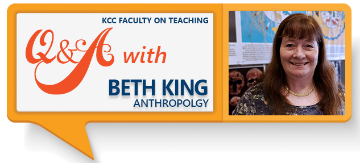KCC Faculty on Teaching
KCC Faculty on Teaching
How did you get into teaching?
While completing my doctorate, I was required to teach several laboratory courses
for a large lecture in anthropology. The labs were for several hours with a small
group of students. I found the experience to be very rewarding and looked forward
to each class. But it would be years before I was given the opportunity to teach again,
and that was at Kingsborough.
What career did you imagine for yourself when you were in college?
I was very experimental in my first years of college. I tried classes in many different
fields. When I took an introductory anthropology class in my sophomore year, I loved
it. But at that time, I did not see a career in anthropology in part because my father
had master’s degrees in anthropology and architecture. He made his living in architecture
and encouraged my interest in archaeology, but argued that it was not a good career
choice and pushed me to go to law school. In my junior year, I went to archaeology
field school and started to explore job opportunities in anthropology. During graduation,
I was one of two graduates in anthropology with employment. I spent the next five
years traveling between archaeological field camps in the U.S. For most of those years,
I was living in a tent. It was an incredibly fun time and I learned so much but it
was not a lifestyle that I wanted to continue doing for years. I applied to graduate
school and looked for other opportunities.
What do you love about teaching?
I really fell in love with teaching a Kingsborough. I cannot think of a better place
for an anthropologist to teach than at a school with such a diverse student body.
I learn something from my students every day. I am amazed at how hard working they
are – many with jobs and young children. I love exploring my field with my students
each semester; it is like looking at it with fresh eyes. Moreover, I met a group of
colleagues willing to help me improve my teaching abilities. I am so thankful for
the KCTL and FIG (Faculty Interest Group) opportunities on campus.
What’s your favorite teaching experience?There are moments in each semester where the students’ openness collides with new knowledge, and we all experience a time of meaningful discovery – beyond the daily goal of acquiring knowledge. My favorite topics in anthropology are often the most difficult to discuss: issues of race, ethnicity and religion. These topics are also the most rewarding for myself and my students. The experiences we share in these discussions change us all. I love to see students gain confidence in their abilities and work hard for good grades. It is so rewarding to see them reach their goals.
In what ways do you bring your professional experience into the classroom?
I worked for many years as an archaeologist. In graduate school, I became a cultural
anthropologist and later worked with the Navajo Nation in the protection of their
sacred areas for many years. My professional experience is extensive and is incorporated
into all aspects of my teaching. I try to give my students an understanding of the
types of evidence used in anthropological findings. While I occasionally enliven my
lectures with stories of encounters with wild animals and problematic cross-cultural
experiences, I mostly try to give a real-world description of working as an anthropologist.
The field of anthropology and archaeology is portrayed dramatically in Hollywood when
the actual work is often less dramatic.
What advice do you have for current students?
My advice is to take some classes just because you are interested in exploring the
topic. Even if you are dedicated to a certain career path, you will still have credits
that need to be filled with classes outside of your major. Use this opportunity to
explore. It is important to design a life that includes your passion and many opportunities
for happiness. I would also advise students to ask their classmates for recommendations
on other classes.

